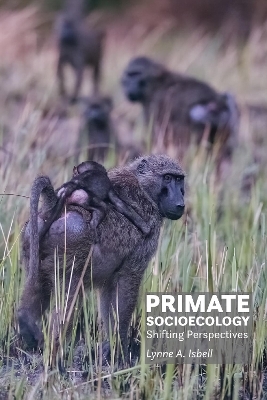
Primate Socioecology
Johns Hopkins University Press (Verlag)
978-1-4214-4890-9 (ISBN)
In Primate Socioecology, renowned researcher Lynne A. Isbell offers a fresh perspective on primate social organizations that redefines the field from the ground up.
Through her innovative Variable Home Range Sharing model, Isbell unravels the mystery of why some primates live alone while others live in pairs or groups—a question that has perplexed scientists for decades. This new approach diverges from the traditional focus on predation pressure as the main determinant of primate social organization to reveal deeper ecological causes of primate behavior. The implications of this shift are profound, underscoring the critical importance of a behavioral-ecological mechanism in which varying movement strategies affect which females share their home ranges and ultimately pointing to a new functional classification system for primate social organizations.
Isbell also discusses:
• a supportive test of predicted movement strategies using activity budgets
• why thermal constraints explain the dichotomy between small nocturnal primates and large diurnal primates
• the role of sensory differences in nocturnal solitary foragers versus diurnal group-living primates
Useful as both an introduction to primate socioecology and for those seeking a robust examination of the topic, Primate Socioecology addresses scientific debates about primate social organizations and invites researchers to question long-held assumptions.
Lynne A. Isbell is a professor of anthropology at the University of California, Davis. She is the author of The Fruit, the Tree, and the Serpent: Why We See So Well and a coauthor of Black, Brown, and White: Stories Straight Outta Compton.
List of Tables
Preface
Acknowledgments
1. Highlights in the History of Primate Socioecology
2. Dispersal and Philopatry
3. The Variable Home Range Sharing Model and Its Classification System for Primate Social Organizations
4. Movement Strategies Help Identify Constraints on Home Range Expansion and Their Importance for Female Social Organizations
5. Beginning to Test the Variable Home Range Sharing Model
6. Problems with Predation as a Selective Force on Primate Social Organizations
7. Resolving the Nocturnal/Diurnal and Solitary/Group Forager Divides
8. Male Contributions to Female Social Organizations
9. Answers to Some Questions about the Model
Appendix
References
Index
| Erscheinungsdatum | 23.07.2024 |
|---|---|
| Zusatzinfo | 3 Illustrations, black and white; 18 Illustrations, black and white |
| Verlagsort | Baltimore, MD |
| Sprache | englisch |
| Maße | 152 x 229 mm |
| Themenwelt | Naturwissenschaften ► Biologie ► Zoologie |
| ISBN-10 | 1-4214-4890-4 / 1421448904 |
| ISBN-13 | 978-1-4214-4890-9 / 9781421448909 |
| Zustand | Neuware |
| Haben Sie eine Frage zum Produkt? |
aus dem Bereich


